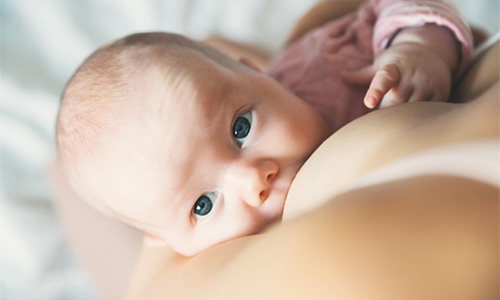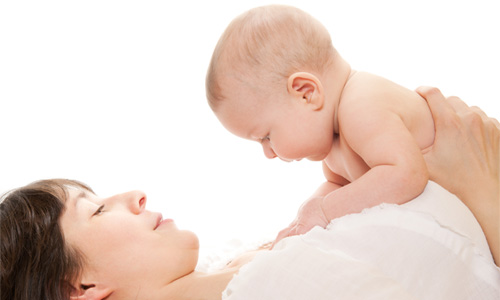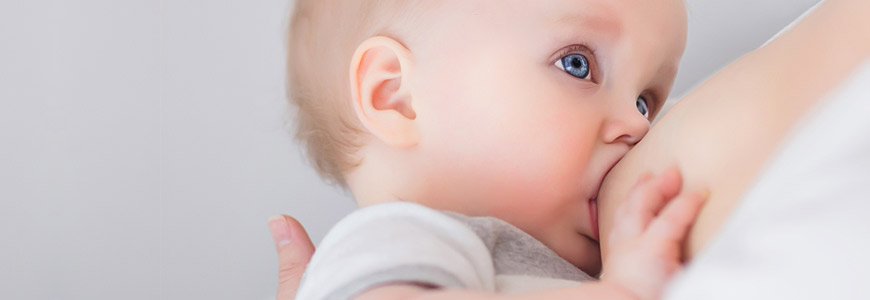Breastfeeding: the best diet for your baby
Congratulations on your pregnancy and future motherhood! Your baby will be here soon and you are probably considering breastfeeding.

At Dexeus Mujer we offer you all our expertise in motherhood at our new Breastfeeding Unit. Here we offer you a personalised service and all the information you need regarding your doubts about breastfeeding, possible difficulties that may arise and the different options that exist when it comes to feeding your baby.
Our Breastfeeding Unit is made up of a team of gynaecologists and midwives who are experts in breastfeeding.
Advantages of breastfeeding
You should know that breastfeeding is the diet that gives children the best possible start in life. The World Health Organization (WHO) recommends exclusive breastfeeding for the first six months of life. Thereafter, infants should receive complementary foods with continued breastfeeding up to the age of 2 years or beyond.
Breast milk is unique. It is a living fluid which is specially designed for your baby and which changes feed by feed, day by day and month by month in order to meet your baby's needs. In addition, it provides active protection against infections.
Most women can feed their children with their own milk. There are very few situations in which breastfeeding is not possible, and with adequate information and support, we are sure you will come to find it enjoyable.
For the mother
- Prevents post-partum haemorrhage, since suckling helps the uterus shrink back to its initial size, and decreases the likelihood of anaemia.
- Helps women return to their pre-pregnancy weight.
- Produce emotional well-being and provides a unique opportunity for mother-child bonding.
- Reduces the risk of breast and ovarian cancer.
- Improves the calcium content of the bones upon reaching the menopause.
For the newborn and the nursing infant
- Confers protection against respiratory infections, otitis, gastrointestinal infections and even urinary infections.
- Protects against Sudden Infant Death Syndrome.
- Breastfeeding entails physical contact between mother and child, which helps the baby feel more secure, warm and comforted.
- Breastfed babies show better dental development, with fewer orthodontic problems and less tooth decay.
- Enhances intellectual development, as breast milk contains key brain growth ingredients.
- Breast milk is digested more easily and has long-term positive effects on the health of the child, reducing the risk of allergies, diabetes, coeliac disease, inflammatory bowel disease, obesity, hypertension or high cholesterol.
- Appears to confer some degree of protection against lymphoma and some other types of cancer.
- Breast milk is the food of choice for all infants including pre-term babies, twins and sick children.
For society and the environment
- It's free. Breast milk saves money by allowing to forgo artificial formula, baby bottles and other utensils used for the preparation of baby formula.
- It reduces medical expenses and work/family problems that infections pose for parents and society by reducing both their incidence and their severity. Reduces reliance on human and material healthcare resources, and allows babies to recover faster when they get ill.
- Breast milk is a natural resource which does not create pollution and help protects the environment: it produces no waste, does not require packaging or energy-dependent processing and causes no CO2 emissions.
How to prepare for breastfeeding during pregnancy
You can attend antenatal classes taught by healthcare professionals.
Seek help, support, advice and information from professional experts in breastfeeding (nurses, midwives, gynaecologists, paediatricians, family doctors, etc.).
Ask questions about anything you need or feel concerned about.
Talk to your partner and exchange information to make joint decisions.
Talk to other relatives to set up a small support network at home in order to allow you to enjoy breastfeeding undisturbed and bond with your baby.
Look for information and go to support groups for nursing mothers.
Do I have to take special care of my breasts while breastfeeding?
There really isn't anything special you need to do for your breasts when you're pregnant or breastfeeding. Daily hygiene is enough. Use handy underwear with adequate support, as this will help you feel more comfortable.

Are there any contraindications for breastfeeding?
- Maternal HIV infection: in this situation, this is considered a true contraindication.
- Galactosaemia: this is a very rare disease which causes babies to be unable to digest lactose in milk, in which case breastfeeding is contraindicated.
Does starting breastfeeding require special circumstances?
If the mother or the child happens to fall ill, bear in mind that most diseases are compatible with breastfeeding and that the clinical course is more favourable if the child is breastfeeding. Talk to healthcare professionals who are also breastfeeding experts to get advice if you are unsure of anything.

Breastfeeding is possible and appropriate even if you are expecting twins or triplets or if your child is born prematurely. The help and support of experts is especially necessary in such situations.
Breastfeeding will be possible even you need to be separated from your baby after delivery due to medical issues. In such cases, it is essential to start manual stimulation-milk expression as soon as possible (ideally within 6 hours after delivery). Ask the healthcare team for information on how to do this.
Can I breastfeed my baby if I am taking medication at the same time?
Seek medical advice if you need to take medication during pregnancy or after delivery. The vast majority of medications can be used during breastfeeding. Package inserts do not always reflect the reality of their compatibility with breastfeeding.
Not all medications pass into breast milk, and generally speaking, alternatives can nearly always be provided if the chosen medication carries any kind of risk. To check if a medication is compatible with breastfeeding, please refer to www.e-lactancia.org and show the result to the healthcare worker looking after you if he or she doesn't know.
At the time of childbirth, remember that:
Colostrum is the first milk that the mammary glands produce in the final months of pregnancy and in the few days after giving birth. It provides your child with all the food he or she needs in those first days. It is very dense and yellowish in colour, and your breasts will not feel full. The milk will gradually become whiter and lighter, and the quantity (of mature milk) produced will increase according to the baby's needs.
It is very important to start breastfeeding as soon as possible after childbirth. Provided that the condition of both baby and mother allow it, skin-to-skin contact between mother and newborns is recommended immediately after birth, for the first two hours at least or until the baby takes his first breastfeed.
When you start breastfeeding, the most important thing is to have confidence in yourself, in your baby's instinct and in the support of professional experts.



